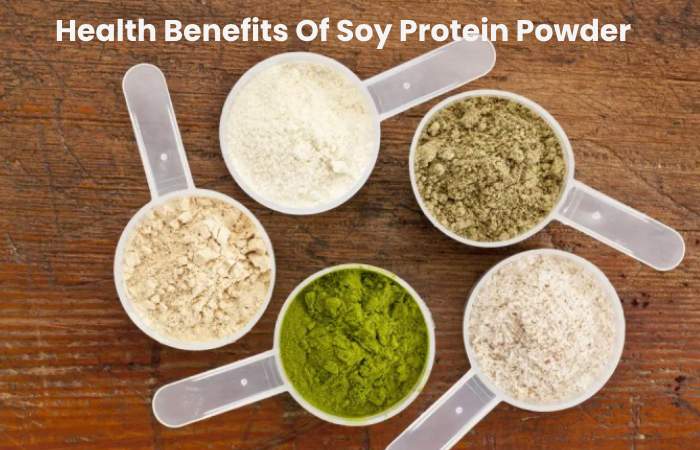Table of Contents
Introduction:
Soy Protein powder is an important macronutrient vital to maintaining a healthy body. While there are various sources of protein available, one that has gained significant attention in recent years is soy protein. Resulting from soybeans, soy protein offers a range of nutritional benefits and has become a popular choice among health-conscious individuals, athletes, and those following plant-based diets.
We will explore the nutritional profile of soy protein, its health benefits, and its significance in plant-based diets. We will also address safety considerations and provide practical tips on incorporating soy protein into your daily meals. Whether you’re looking to improve your overall health, enhance athletic performance, or transition to a more plant-based lifestyle, understanding the benefits and versatility of soy protein can be a valuable asset.
Nutritional Profile Of Soy Protein Powder
According to USDA, 100 grams of Soy protein powder contains the following nutrients.
Calories: 335 kcal
Protein: 88.3 g
Total Fat: 3.39 g
Carbohydrates: 0 g
Fibre: 0 g
Calcium: 178 mg
Iron: 14.5 mg
Magnesium: 39 mg
Phosphorous: 776 mg
Potassium: 81 mg
Sodium: 1000 mg
Zinc: 4.03 mg
Health Benefits Of Soy Protein Powder

Soy protein offers a wide array of health benefits, making it an attractive choice for individuals seeking to optimize their nutrition. Let’s explore some of the key advantages associated with incorporating soy protein into your diet:
1. Role of Soy protein powder in Muscle Building and Recovery
Soy protein is a whole protein containing all important amino acids necessary for muscle growth and repair. The amino acid profile of soy protein, particularly its high leucine content, stimulates muscle protein synthesis, making it beneficial for athletes and individuals engaged in resistance training. Also, soy protein’s anti-inflammatory properties can aid post-workout recovery and alleviate muscle soreness.
2. Potential Benefits of Weight Management
Soy protein has been found to promote feelings of fullness and satiety, which can help reduce overall calorie intake and support weight management goals. Furthermore, research indicates that adequate protein intake, including soy protein, can help preserve lean muscle mass in weight loss, which is essential for maintaining a healthy metabolism.
3. Impact on Cardiovascular Health
Soy protein has been shown to help lower LDL fat (often called “bad” cholesterol levels), which reduces the risk of heart diseases. Some studies suggest that soy protein consumption may contribute to a modest reduction in blood pressure levels, promoting cardiovascular health. Additionally, soy protein is naturally low in saturated fat and contains heart-healthy nutrients such as fiber, antioxidants, and unsaturated fats.
4. Relationship to Bone Health
Soy protein contains natural compounds called isoflavones, which have estrogen-like effects on the body. Studies indicate that these isoflavones may improve bone mineral density and decrease the risk of osteoporosis in postmenopausal women. Many soy-based products, such as fortified soy milk, provide added calcium and vitamin D, essential nutrients for bone health.
5. Potential Anti-cancer Properties
Soy protein contains bioactive compounds, including isoflavones and other phytochemicals, which have shown potential anti-cancer properties in various studies. Some evidence suggests that regular soy consumption may be associated with a reduced risk of certain hormone-related cancers, such as chest and prostate cancer.
Cafeshape Suggestions
Soy meals contain B vitamins, fibre, potassium, magnesium, and high-quality protein. Unlike certain plant proteins, soy protein is called a complete protein since it contains all nine important amino acids that the body cannot make and must obtain from diet. Soy meals are adaptable and can be used in the same manner as animal proteins. Sandwiches, soups, salads, side dishes, dinners, and smoothies are all examples of foods that contain soy. Eating soy protein, especially natural and less processed foods such as edamame, tofu, and tempeh, may give a number of health benefits.
Conclusion
Soy protein powder Incorporating soy protein into your diet can offer numerous health benefits and is particularly advantageous for individuals following plant-based diets. Soy protein is a complete protein source, providing all essential amino acids necessary for muscle building and repair. It supports weight management, cardiovascular health, and bone density, and may possess potential anti-cancer properties. Soy protein can be obtained from various sources such as tofu, tempeh, edamame, and soy milk, offering versatility in meal preparation.
Related posts
Featured Posts
Best Gynecologist in Kolkata
What do you mean by a Gynecologist? The studies and treatments of the medical conditions and diseases of women are…
Face Swimsuit – A Breakdown of Swimsuit Styles
Introduction Face Swimsuit – Make your very own face swimsuit in two fabrics and eight sizes. Face-on swimsuit print is…


